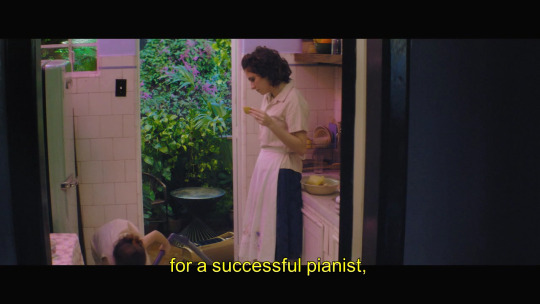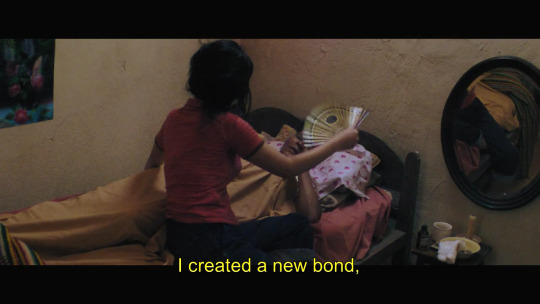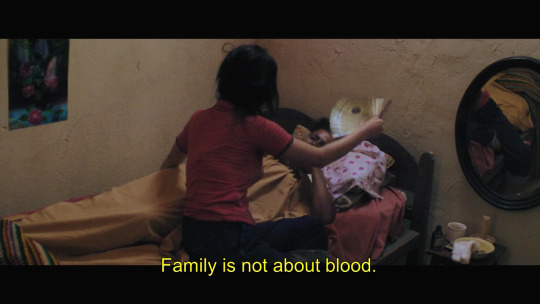#murilo hauser
Explore tagged Tumblr posts
Text
‘I’m Still Here’ became unexpectedly timely with Brazil’s rightward shift

In Walter Salles’ “I’m Still Here,” the lives of a Brazilian family are torn apart when the father goes missing under a military dictatorship. (Alile Onawale/Sony Pictures Classics)
By Gregory Ellwood Dec. 4, 2024 3 AM PT
When Walter Salles first read the novel “I’m Still Here,” written by his childhood friend Marcelo Rubens Paiva, it took him back to his adolescence. A time when Brazil hadn’t completely lost its innocence. In 1969, after spending five years abroad, Salles and his family returned to Rio de Janeiro. Then 13, he became friends with the Paiva family’s five children. And although the country was under military dictatorship, the Paiva home, in walking distance of a paradisiacal beach, was something of a sanctuary.
“We all gravitated to that house because it was the reverse angle of what was happening in Brazil at that time,” Salles recalls. “There was free speech; we could talk about absolutely everything. Music that was censored on the radio was playing all the time on their record player. You could enter a political discussion with the parents, and then you could talk about music and whatever was happening at that time — a fascinating time because the world was being redefined at that point, and Brazil was in the opposite direction. So, somehow that house and that family was a microcosm of a country we all kind of wanted to live in.”
As depicted in Salles’ eventual film of the same title, the patriarch of the family, former Congressman Rubens Paiva, was arrested and taken in for questioning on Jan. 20, 1971. He was never seen alive again. It took his wife, Eunice Paiva, primarily portrayed by Fernanda Torres in the film, more than two decades to have his death officially recognized by a Brazilian government intent on moving forward.
“As we were developing [the movie], the zeitgeist changed completely, and we were faced with the rise of the extreme right-wing in Brazil,” Salles says. “And their discourse was, ‘Let’s go back to a wonderful time of the military dictatorship.’ And there we were suddenly realizing that we were making, yes, a film about our past, but at the same time we were making a film about the present — what we were experiencing in every discussion on every street corner.”
It took Salles and his creative partners seven years and at least 28 versions of the script before they were confident to begin production. The film eventually premiered at the 2024 Venice Film Festival and was selected as Brazil’s international feature Oscar submission. Salles immediately informs the viewer of the political context of the story: The menacing threat of the authoritarian regime is there in the very first image, a shot of a woman, Eunice Paiva, swimming in the ocean.
“It could be paradise, but then there’s a military helicopter flying over her, and that helicopter is menacingly low, and it shouldn’t be,” Salles says. “So, there’s something from the very beginning that is kind of destabilizing and that somehow echoes through the first 30 minutes of the film here and there. That scene for us was always a little equivalent of a Greek omen at the beginning of an Aeschylus tragedy. The birds, the vultures are circling.”

Fernanda Torres stars in “I’m Still Here,” based on a the story of a Brazilian family that director Walter Salles knew growing up. (Alile Onawale/Sony Pictures Classics)
Salles lost touch with the Paivas after they left Rio in the early 1970s. Marcello’s novel triggered a desire for Salles to revisit that era — in this case, with the story of a broken family and a matriarch who had to reinvent herself to give her children any sort of future. The filmmaker calls it a “microcosm of humanity during a time of turmoil.” And, along with his celebrated films such as “Central Station” and “The Motorcycle Diaries,” it was another opportunity to share the collective journey of a country through the individual stories of its people.
“I didn’t know all the layers of the story, and I didn’t know the extent to which this woman had managed to reinvent herself, had somehow found manners to erode an autocratic government using very specific weapons,” Salles says. “So, the book was fundamental in allowing me in. And then the whole family was very supportive during those years and sent so much information, so many photographs. And this is what allowed me metaphorically to reopen that house. I felt invited to reopen that house.”
Along with screenwriters Murilo Hauser and Heitor Lorega, Salles embraced the fact that Eunice Paiva was a woman full of steely resolve but also internal contradictions. She never allowed herself or her family to be photographed by the government without a smile. She never allowed the government or the press to see her children crying.
“This is a woman who was fueled by extraordinary inner strength, who also could say words that were very poignant and, at the same time, appear to be restrained,” Salles notes. “She’s like a volcano that is always near eruption but actually does not erupt. There’s always something bubbling inside of her that she somehow restrained. There’s something really extraordinary and heroic in her confrontation with that regime. But on the other hand, it was so tough for her kids to actually have a mother who never truly shared what happened to their father. She never articulated that in a clear manner, thus depriving them of the possibility to get to closure on that.
“As Fernanda Torres says, ‘In tragedy, you don’t cry; you have to confront, you take in and then you react.’ And this is what she did. And with an extraordinary inner strength, but a great ambivalence as well.”
#Los Angeles Times#Fernanda Torres#Fernanda Montenegro#Walter Salles#Sônia Braga#Golden Glbes#Aquarius#Kleber Mendonça Filho#Eunice Paiva#Rubens Paiva#Murilo Hauser#Heitor Lorega#I'm still here#Marcelo Rubens Paiva#Cinema#Brazil#Brazilian Cinema
29 notes
·
View notes
Text











A vida invisível, 2019
#drama#a vida invisível#invisible life#a vida invisível de eurídice gusmão#karim aïnouz#murilo hauser#inés bortagaray#martha batalha#julia stockler#carol duarte#fernanda montenegro
10 notes
·
View notes
Text
I’M STILL HERE (2024):
Family’s lives changed
Husband taken by army
Mother’s hidden strength
youtube
#i’m still here#random richards#poem#haiku#poetry#haiku poem#poets on tumblr#haiku poetry#haiku form#eunice paiva#fernanda torres#fernanda montenegro#rubens paiva#selton mello#valentina herszage#walter salles#murilo hauser#heitor lorega#ainda estou aqui#Marcelo Ruebens paiva#Maria manoella#Barbara luz#luzia kosovski#marjorie estiano#guilherme silveira#antonio saboia#academy award nominee#best picture#best international feature film#best actress
4 notes
·
View notes
Text

I'm Still Here (Ainda Estou Aqui), Walter Salles (2024)
#Walter Salles#Murilo Hauser#Heitor Lorega#Fernanda Torres#Fernanda Montenegro#Selton Mello#Valentina Herszage#Bárbara Luz#Marjorie Estiano#Luiza Kosovski#Gabriela Carneiro da Cunha#Antonio Saboia#Cora Mora#Humberto Carrão#Maeve Jinkings#Adrian Teijido#Warren Ellis#Affonso Gonçalves#2024
0 notes
Text
I'm Still Here (2024) Review
Eunice Paiva must attempt to project her family when her husband Rubens is taken during the tightening grup of military dictatorship in Brazil 1971. ⭐️⭐️⭐️⭐️ Continue reading I’m Still Here (2024) Review

View On WordPress
#2024#Ainda Estou Aqui#Antonio Saboia#Barbara Luz#Best Picture Project#Biography#Brazilian#Charles Fricks#Cora Mora#Drama#Fernanda Montenegro#Fernanda Torres#Heitor Lorega#History#Humberto Carrao#I&039;m Still Here#Luiza Kosovski#Maeve Jinkings#Marcelo Rubens Paiva#Maria Manoella#Marjorie Estiano#Murilo Hauser#Olivia Torres#Review#Selton Mello#Valentina Herszage#Walter Salles
1 note
·
View note
Text
I'm Still Here
I did not realize that this was a biopic, so the revelation that this was adapted from the son's biography felt like a finishing blow after the emotional punches, from the last, longing look at the house to the shot of a housekeeper silently packing up her belongings. Once you know that it's a biopic, you can see the biopic structure, but when it's this well done, you can forgive it for playing to form.
It made me think of Roma, one of my favorite films, which is about as high a compliment as I can give.
#walter salles#movies#films#i'm still here#murilo hauser#heitor lorega#fernanda torres#selton mello#fernanda montenegro
1 note
·
View note
Text
I'm Still Here: The Brazilian Oscar Wild-card Deserves It's Place.
A One Mann’s Movies review of “I’m Still Here” (2025). Original title: Ainda Estou Aqui. This film was the big surprise when the Oscar nominations for Best Picture were announced last month. “I’m Still Here” is a Brazilian produced and set film about life under the tyranny of military dictatorship in Rio de Janeiro in the early 1970s. I very much doubt it is going to win that top prize since I…
#Ainda Estou Aqui#Alfonso Cuarón#Antonio Saboia#Bárbara Luz#bob-the-movie-man#bobthemovieman#Cinema#Cora Mora#Demi Moore#Fernanda Montenegro#Fernanda Torres#Film#film review#Gabriela Carneiro da Cunha#Guilherme Silveira#Heitor Lorega#I&039;m Still Here#Luiza Kosovski#Marcelo Rubens Paiva#Maria Manoella#Marjorie Estiano#Mikey Madison#Movie#Movie Review#Murilo Hauser#Olívia Torres#One Man&039;s Movies#One Mann&039;s Movies#onemannsmovies#onemansmovies
1 note
·
View note
Text
‘I’m Still Here’: A stark history and warm memoir of Brazil’s darkest days

Walter Salles’s “I’m Still Here” is an epic within an epic: a teeming family drama contained within the melodrama of a country going insane.
No, it’s not set in modern-day America. Perhaps that’s the point: If we’re not very careful, it could be.
Brazil in 1970 existed in a state of constant tension, with a military dictatorship installed in a 1964 coup that was overseeing a resurgent economy and the increasingly brutal repression of anyone it saw as stepping out of line. Among the latter was Rubens Paiva (Selton Mello), a civil engineer and congressman from São Paulo who fled the country when his position was nullified by the dictatorship, but who returned within the year because he couldn’t keep away from his wife and kids.
You can hardly blame him. If you were lucky growing up, you knew one of those big, warm, rambunctious families whose dinner table was always open to strays and whose conversations on art, politics, culture and morality expanded one’s brain and the possibilities of life. (If you were luckier still, it was your family.) The Paivas were one of those special clans, and director Salles was, in his youth, one of the strays at their table, making “I’m Still Here” as much personal memoir as national history.
In Mello’s playing, Rubens is affable, smart and maybe too unconcerned for his personal safety. Or maybe he just doesn’t have the time, since he’s active in labor causes, holds meetings at home, publishes a left-wing newspaper and insists on being a present, loving father to his five children. In this, his wife Eunice (Fernanda Torres) is his partner and equal.
And then, one day in January 1971, Rubens is taken away for questioning, and “I’m Still Here” depicts the harrowing disorientation of a home invaded by men with guns. Eunice was detained and interrogated for a brief period, as was their adolescent daughter Eliana (Luiza Kosovski), and the glimpses Salles gives of the junta’s tactics — blood on the floor, screams down the hall — chill them and us to the marrow.
At this point, Eunice comes to the fore as the real hero of “I’m Still Here,” embarking on a relentless course of action to discover her husband’s whereabouts while holding her family together with elegance and grit. That path would eventually take her to a law degree and a national role as an activist pushing for the government’s recognition of those who were “disappeared” during the dictatorship, which ended in 1985. (The script by Murilo Hauser and Heitor Lorega is based on a 2015 memoir by Eunice and Rubens’s only son, Marcelo, a successful Brazilian playwright and screenwriter.)
Continue reading.
#brazil#politics#democracy#i'm still here#history#brazilian politics#cinema#arts#image description in alt#mod nise da silveira
31 notes
·
View notes
Text
"Ainda Estou Aqui" é escolhido como representante brasileiro no Oscar 2025
A Academia Brasileira de Cinema anunciou que Ainda Estou Aqui irá concorrer à indicação de Melhor Filme Estrangeiro no Oscar pelo Brasil. #aindaestouaqui #oscar2025
A Academia Brasileira de Cinema anunciou nesta xxxx (xx), que “Ainda Estou Aqui” irá concorrer à indicação de Melhor Filme Estrangeiro no Oscar pelo Brasil. O filme foi aclamado em sua estreia no Festival de Veneza e venceu a categoria de Melhor Roteiro na premiação. Com direção de Walter Salles (Central do Brasil) e roteiro de Murilo Hauser e Heitor Lorega, o longa é baseado na história real…
2 notes
·
View notes
Text


CALIFICACIÓN PERSONAL: 8 / 10
Título Original: Ainda estou aqui
Año: 2024
Duración: 137 min.
País: Brasil
Director: Walter Salles
Guion: Murilo Hauser, Heitor Lorega. Libro: Marcelo Rubens Paiva
Música: Warren Ellis
Fotografía: Adrian Teijido
Reparto: Fernanda Torres, Selton Mello, Fernanda Montenegro, Luiza Kosovski, etc
Productora: Coproducción Brasil-Francia; VideoFilmes, RT Features, MACT Productions, Cospiraçao Filmes, ARTE France Cinéma, Globoplay
Género: Biography; History; Drama
TRAILER:
youtube
1 note
·
View note
Text

#ProyeccionDeVida
📣 Kino Cat / Cine Tulipán, presenta:
🎬 “AÚN ESTOY AQUÍ” [Ainda Estou Aquí]
🔎 Género: Drama / Política / Familia / Años 70 & 90 / Biográfico / Secuestros / Desapariciones
⌛️ Duración: 137 minutos

✍️ Guion: Murilo Hauser y Heitor Lorega.
📘 Libro: Marcelo Rubens Paiva
🎼 Música: Warren Ellis
📷 Fotografía: Adrian Teijido

🗯 Argumento: Basada en las memorias de Marcelo Rubens Paiva, en las que narra cómo su madre se ve obligada al activismo político cuando su marido, el diputado izquierdista Rubens Paiva, fue capturado por el gobierno durante la dictadura militar de Brasil, en el año 1971.

👥 Reparto: Fernanda Torres (Eunice Paiva), Fernanda Montenegro (Eunice Paiva), Valentina Herszage (Vera Paiva), Selton Mello (Rubens Paiva), Olívia Torres (Maria Beatriz Facciolla Paiva) y Bárbara Luz (Nalu Paiva).
📢 Dirección: Walter Salles
© Productoras: VideoFilmes, RT Features, MACT Productions, Cospiraçao Filmes, arte France Cinéma & Globoplay.
🌎 Países: Brasil-Francia
📅 Año: 2024

📽 Proyección:
📆 Martes 25 de Marzo
🕖 7:30pm.
🐈 El Gato Tulipán (Bajada de Baños 350 – Barranco)
🚶♀️🚶♂️ Ingreso libre
0 notes
Text
Review: Fernanda Torres pulls off a miracle of maternal courage in ‘I’m Still Here’

Fernanda Torres in the movie “I’m Still Here.” (Alile Onawale / Sony Pictures Classics)
By Carlos Aguilar Jan. 17, 2025 @ 2:46 PM PT
Soufflé is almost ready at the Paiva household just across the street from the beach in sultry Rio de Janeiro, Brazil. From the unmistakably festive atmosphere within the home’s airy rooms, one wouldn’t guess the country is under a ferocious military dictatorship.
That Walter Salles, the acclaimed director of “Central Station” and “The Motorcycle Diaries,” first depicts the tight-knit family of “I’m Still Here” at their most ebullient, before tragedy strikes, pays off dramatic dividends in this remarkably life-affirming drama largely set in 1971 and based on the 2015 memoir by Marcelo Paiva (the Paivas’ only son). A contender for the upcoming international feature Oscar, “I’m Still Here” brilliantly distills an agonizing chapter of a nation’s recent past into a sophisticated portrait of communal endurance.
Already lauded for her quietly shattering performance with a surprise Golden Globes win (the first Brazilian actress to ever receive the prize), Fernanda Torres portrays Eunice Paiva, a mother of five who is married to former Congressman Rubens Paiva(Selton Mello). We see the pent-up worry on her face signaling incipient danger: Helicopters roam the city while news of kidnapped ambassadors pours from the radio.
Within the walls of the Paiva residence (the film was shot in the actual house that belonged to the family), Salles and his cast of both seasoned and fresh-faced actors create a vibrant, lived-in dynamic radiating with affection and carefree liberty. And because we’ve been so wonderfully immersed in the exuberance they are all about to lose, when the darkness reaches their doorstep, in the form of henchmen who take Rubens in for questioning, the contrast between who they were and who they become feels stark.
By that point, Mello has potently established the fatherly warmth his family will sorely miss. In that absence, memory becomes central to “I’m Still Here.” The narrative is interspersed with home movies shot on a 8 mm camera, immortalizing candid instances of leisure and love, the ones that truly matter. Not only are they indelible in the minds of the Paivas, but they are forever preserved in still photos, in Marcelo Paiva’s writing and now onscreen through Salles’ filmic rendition.
The director and cinematographer Adrian Teijido also make the home a shifting co-star and a physical metaphor for Brazil as a whole. Once a place where friends and family entered through perpetually open doors, the space becomes hermetic and airless when curtains are drawn to hide the men who have come to disrupt this idyllic refuge. Through them, the dictatorship instills fear and distrust to maintain power. Salles communicates the state-sanctioned distress by focusing on the family’s upended quotidian rituals.
Eunice responds by offering these goons lunch — maybe in the hope that their ordeal will end sooner, but also as a statement of the type of person she is even to those who might hurt her. (Eventually, she and one of her daughters are detained and interrogated, then released.) Those seemingly muted details about her rich personality come from Marcelo Paiva’s intimate reminiscences about his mother and the Paivas’ collective experience in the aftermath of Rubens’ disappearance, expertly adapted by screenwriters Murilo Hauser and Heitor Lorega.
Torres exudes the unflashy fortitude of a woman unable and unwilling to surrender to despair as the days and weeks go by. How can she when she must raise her children and seek justice for her husband, who may still be alive? Imparting masterful restraint, Torres makes Eunice’s few outbursts feel believably contained. As distanced from melodrama as possible, her performance is one of internalized grief.
And yet, in the midst of her hidden mourning, Eunice treats those around her with loving understanding, empathetic to their respective fears and the limitations of what they can do for her. She moves through the world with a humble resolve, unafraid of doing what needs to be done, never dwelling on what could or should have been done. At every turn, we recognize her desire to spare her kids from the sorrow she carries. A guardian of their tender hearts, she can only hide so much in an authoritarian reality.
Even mere moments after receiving crushing news, Eunice musters up a smile for her youngest daughter and the energy to take the whole gang out for ice cream, seeking to regain a semblance of what they used to have. That amalgamation of a graceful pride during a crisis and superhuman determination is crucial to Torres’ embodiment of Eunice’s inner force. And because she’s perceived as nearly unbreakable, when sorrow does slip through her eyes in a lost stare or a weighted silence, Torres’ expression is beautifully gutting.
Acting of this subtle caliber is rarely celebrated, but Torres unassuming turn has proved undeniable to anyone who watches it. For a film like “I’m Still Here” to emerge on the other side of the repressive Jair Bolsonaro presidency and be embraced at home and abroad so earnestly (it’s Brazil’s highest grosser since the pandemic) is testament to Salles’ assured directorial hand that treats the delicate subject matter with the seriousness it merits while highlighting humanity rather than brutality. There’s a striking elegance to his images in how they bring us closer to the people, not the horrors.
When a photographer suggests that the family pose with a somber demeanor for a shot that will be featured in an article about Rubens’ disappearance, Eunice refuses, instructing her children to smile broadly. Joy proves defiant to the shadowy oppressors who wish to see their “enemies” suffer. Eunice’s victory, as witnessed by Marcelo Paiva and resurrected by Torres (and, briefly, by Brazilian legend Fernanda Montenegro, Torres’ Oscar-nominated mother), is not just about survival but fostering a family united in adversity.
Resistance takes the form of lives well lived. In every laugh shared, in every new memory made and family photo taken, this clan honors those no longer physically present.
'I'm Still Here' In Portuguese with English subtitles Rated: PG-13, for thematic content, some strong language, drug use, smoking and brief nudity
#The Los Angeles Time#Carlos Aguilar#Ainda Estou Aqui#I'm Still Here#Walter Salles#Murilo Hauser#Heitor Lorega#Marcelo Rubens Paiva#Fernanda Torres#Fernanda Montenegro#Selton Mello#Valentina Herszage#Maria Manoella#PG-13#Biography#Drama#History#Eunice Paiva#Maria Lucrécia Eunice Facciolla Paiva#Rubens Beyrodt Paiva#Rubens Paiva
6 notes
·
View notes
Text








A vida invisível, 2019
#drama#a vida invisível#invisible life#karim aïnouz#murilo hauser#inés bortagaray#martha batalha#carol duarte#julia stockler#bárbara santos#bonds
17 notes
·
View notes
Text
0 notes
Text
Filme brasileiro "Ainda Estou Aqui", de Walter Salles, vence prêmio de Melhor Roteiro em Veneza
O mais recente trabalho do renomado cineasta brasileiro Walter Salles, “Ainda Estou Aqui“, conquistou o prêmio de Melhor Roteiro na 81ª edição do Festival de Veneza.A honraria, conhecida como Golden Osella, foi entregue aos roteiristas Murilo Hauser e Heitor Lorega durante a cerimônia de encerramento no Palazzo del Cinema, no último dia 07 de setembro.Inspirado no livro homônimo de Marcelo Rubens…
#Cinema#Cinema Brasileiro#Cinema Nacional#Dicas de Filmes#Fernanda Montenegro#Festival de Veneza#filmes
0 notes
Text
‘Ainda Estou Aqui’: Longa com Fernanda Torres vence prêmio de Melhor Roteiro no Festival de Veneza
Inspirado no livro homônimo de Marcelo Rubens Paiva, o longa ‘Ainda Estou Aqui‘, dirigido por Walter Salles, que foi aplaudido por 10 minutos na sessão de sua estreia mundial, acaba de receber o prêmio de melhor roteiro para Murilo Hauser e Heitor Lorega, na competição oficial do 81º Festival de Veneza, o Golden Osella, entregue […]
0 notes